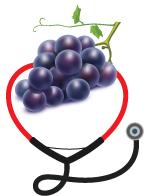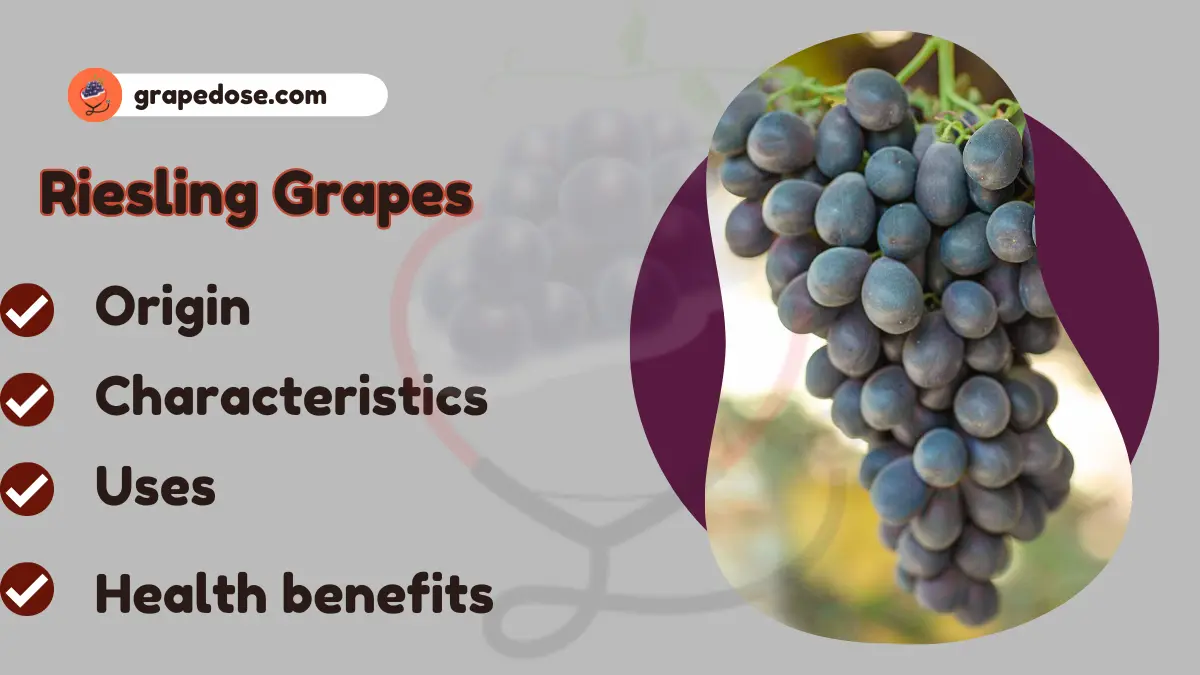Riesling grapes are a popular white wine grape variety that originated in the Rhine region of Germany.[1]
They are known for their high acidity, floral aromas, and ability to produce a wide range of styles, from dry to sweet. Riesling grapes are grown in many countries around the world, but they are particularly well-suited to cool climates.

Origin of Riesling Grapes
Riesling grapes originated in Germany’s Rhine region, and their name may come from the German word “Riesen.”
Known for thriving in cooler climates, Riesling has become a prominent grape variety in Germany and is now cultivated globally, producing versatile white wines celebrated for their acidity and aromatic qualities.
Characteristics of Riesling Grapes

- Riesling Grapes are Suited for a range of wine styles from dry to sweet.
- Riesling Grapes are Intense floral and fruity aromas, such as citrus, peach, and honey.
- Riesling Grapes are High natural acidity, providing a crisp and refreshing taste.
- Riesling Grapes are Many Rieslings age well, developing complex flavors over time.
- Riesling Grapes are Reflects terroir, allowing the expression of the vineyard’s characteristics.
- Riesling Grapes are Depending on the winemaking style, Riesling wines can range from light and zesty to full-bodied and rich.
- Riesling Grapes are crafted in various sweetness levels, catering to different preferences.
Uses of Riesling Grapes
- Riesling grapes are often used to make sweet dessert wines, showcasing their natural sweetness and fruity character.
- Riesling grapes can be used to produce dry white wines, with a crisp acidity and a range of flavors from floral to citrus.
- Some regions use Riesling in the production of sparkling wines, contributing to the wine’s effervescence and adding a bright, refreshing quality.
- Winemakers may leave Riesling grapes on the vine longer to achieve late harvest wines, which are richer and more intense in flavor due to the grapes’ increased sugar concentration.
- In colder climates, Riesling grapes are left on the vine until they freeze, producing ice wines that are exceptionally sweet and concentrated.
Health benefits of Riesling Grapes

1: Cancer Prevention
The antioxidant and anti-inflammatory properties of Riesling grapes may play a role in cancer prevention.
Studies have found that resveratrol inhibit cancer cell growth and proliferation, potentially reducing the risk of certain types of cancer, such as breast and colon cancer.
2: Immune System Support
The antioxidants in Riesling grapes may boost the immune system by enhancing the body’s natural defenses against infections.
Antioxidants help to reduce oxidative stress, which weaken the immune system’s ability to fight off pathogens.
3: Diabetes Management
Some studies suggest that resveratrol may have beneficial effects on blood sugar control, potentially aiding in diabetes management.
Resveratrol has been shown to improve insulin sensitivity, helping the body utilize glucose more effectively.
4: Bone Health
Riesling grapes contain potassium, a mineral essential for bone health. Potassium helps regulate bone density and may reduce the risk of osteoporosis, a condition characterized by weak and brittle bones.
Riesling Wine Varieties
The divide between sweet and dry Rieslings offers choices for every palate. Additionally, sparkling Rieslings add effervescence to the spectrum, providing a refreshing twist to this classic varietal.
Riesling grapes, with their rich tapestry of flavors and cultural significance, continue to captivate wine enthusiasts globally. From its humble origins in Germany to its diverse expressions in vineyards across the world, Riesling remains a true icon in the world of wine.
FAQs about Riesling Grapes
Is Riesling only sweet, or are there dry varieties?
Riesling comes in both sweet and dry varieties, offering a broad spectrum of options for different preferences.
What makes Riesling wines pair well with a variety of foods?
Riesling’s acidity and versatility make it a great companion for a range of dishes, from seafood to spicy cuisines.
How does terroir influence the taste of Riesling wines?
The unique characteristics of the soil and climate in different regions impact the flavors and aromas of Riesling wines.
Are there any health benefits associated with consuming Riesling in moderation?
Some studies suggest potential health benefits due to Riesling’s antioxidant properties, but moderation is key.
Where can I learn more about Riesling and its diverse expressions?
Participating in Riesling festivals and events is a great way to explore and learn more about the world of Riesling wines.

